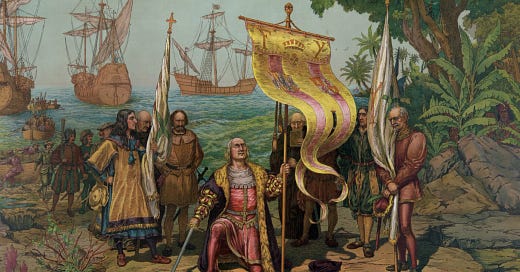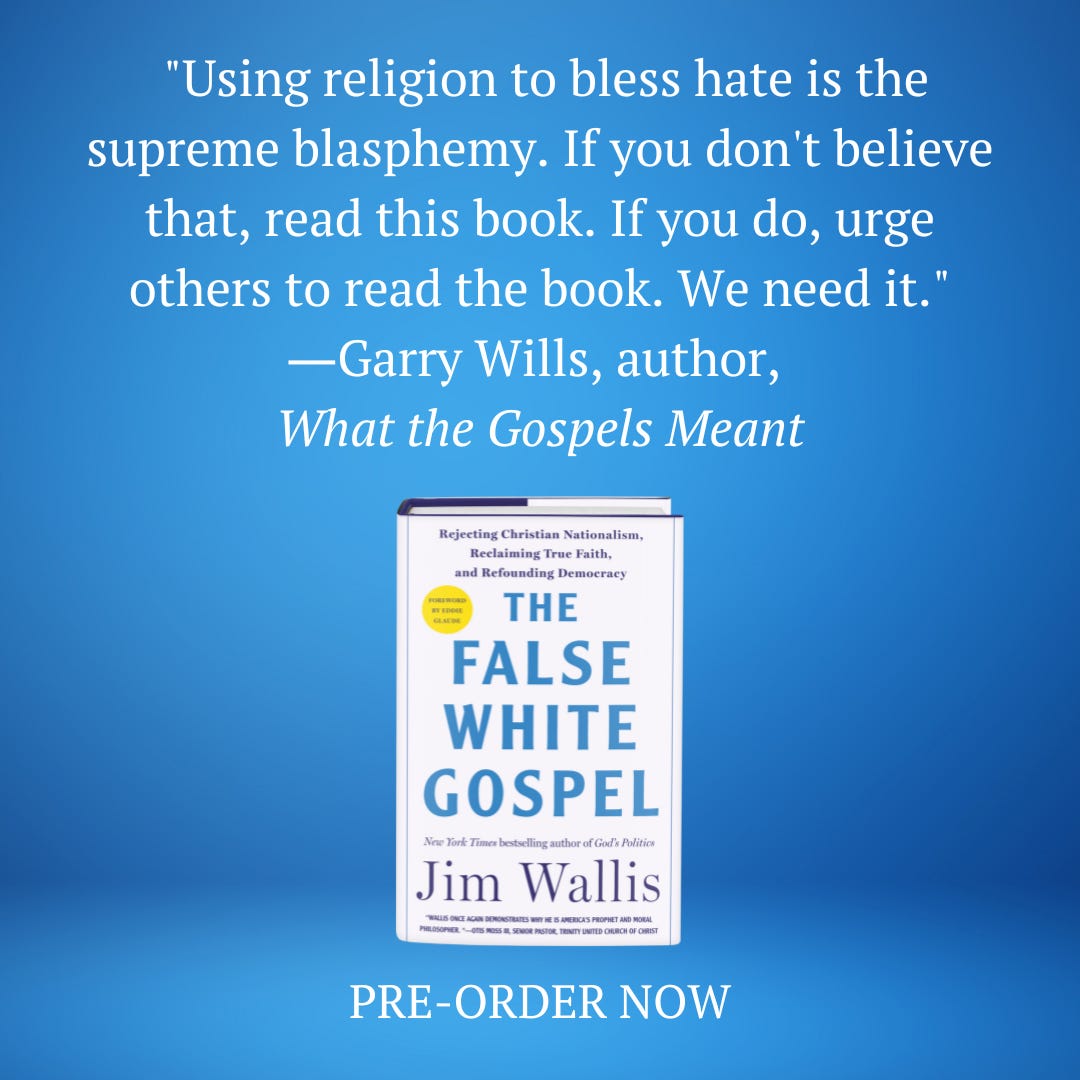Columbus was a White Christian Nationalist
We shouldn't celebrate his deeds. We should repent of them.
When I look back on “Columbus Day” during my youth and schooling, we all learned the little rhyme: “In 1492, Columbus sailed the ocean blue… .” We were taught that the famous explorer “discovered America,” even though he never set foot on American soil.
But the year 1493 was more significant than 1492. It’s when Columbus sailed back west with the authority of the European church and state – papal bulls and government instruction – to conquer, not discover, the lands and indigenous people who were already there.
Some Catholic priests and leaders dissented from these papal bulls and the violent assaults against those already dwelling in those lands; but colonial greed, with the backing of religion, prevailed over good theology.
Long before 1776 and even 1619, when the first kidnapped Africans were brought on slave ships to American shores, the Doctrine of Discovery was the foundation for America’s Original Sin of white supremacy. It sanctioned the near genocide of indigenous people, the slavery of kidnapped Africans and the European colonization and exploitation to follow.
So, indeed, Christopher Columbus was a founder of America’s Original Sin and a pioneer of White Christian Nationalism. Those are the facts and history. Columbus did much more than sail the ocean blue.
All of this is documented in the powerful new book by Robert P. Jones, The Hidden History of White Supremacy: and the Path to a Shared American Future, which our Georgetown Center on Faith and Justice helped to launch on September 6.
A review of Robby’s book in The New York Times Book Review by indigenous scholar Ned Blackhawk explains why it is so important to begin at the origins of America’s Original Sin from the beginning of the conquest of America’s original inhabitants, if we hope to move this nation forward.
Blackhawk writes: “Much is to be gained from Jones’s deep, comparative immersion in local efforts to ameliorate the wounds of the past. He shows how countless Indigenous and African American lives have been irrevocably harmed over the past five centuries and how leaders at every level of government have failed to offer sufficient commemoration, repair or justice. “Christianity,” Jones writes, “has also proven to be more pliant than principled.”
Those 15th century church edicts and political directives gave the “new” American lands to whichever European nations first conquered them by declaring the superiority of the white European race over all other races, cultures, and people. It was a religious sanction offering political and property rights, and a supposedly divine mission, to dominate the lands and its abundant resources, to destroy the indigenous people and their cultures and to turn human beings into chattel property.
Robby’s book also powerfully lays out how the “missionary zeal” of those doctrines of discovery are still with us in the very culture and structures of American society today. I asked him, in light of his new book, to comment on the Columbus Day holiday the nation is about to celebrate again on October 9. Here is what he said:
“Unlike the only other two federal holidays honoring people—George Washington’s birthday and Martin Luther King’s birthday—the man behind Columbus Day has only a tenuous connection to the United States. From a pragmatic point of view, celebrating Indigenous Peoples’ Day instead of Columbus Day as an official federal holiday would appropriately honor the original inhabitants of this land rather than someone who never set foot on soil within the borders of the United States. From a moral perspective, it would liberate us from venerating a man who personally profited from the enslavement and murder of those he saw as inferior people. From a democratic standpoint, it would powerfully orient us to the ongoing work to form a more perfect union. And, most importantly for those of us with European Christian roots, it would serve as a call to repent from the dominant historical stream of western Christianity that blatantly exchanged evangelism for settler colonialism, community for white supremacy, and service for violent exploitation.”
So what would repentance mean?
That’s what Monday should be all about: asking that question. In some places, a new Indigenous People’s Day is now recognized. In October 2021, President Joe Biden became the first president to commemorate Indigenous Peoples’ Day alongside Columbus Day. Other places are trying to move away from the old language. Georgetown now calls the second Monday of October the “Mid-Semester Holiday.”
Changing names is an important start — but is, of course, not enough. Historical atrocities must now indeed be repented of. And remember that repentance, in all our religious traditions, is not just feeling sorry and shameful, but literally means turning around and going in a new direction.
What will it mean for us culturally and governmentally to finally recognize and respect the sovereignty of indigenous nations and the dignity of indigenous people? What would it mean to invite the voice of indigenous people into our governmental decision-making?
Three of my students in my fall class on “Faith, Race, and Politics” are from Australia, and we have discussed the upcoming national referendum in their country that would give that political voice to the Aboriginal people there. Of course, the whites in Australia are divided on that vote. Watch that carefully.
This just isn’t about a holiday – but changing how we name, perceive, and celebrate a day is a good start. We need times and places and spaces where we do the deeper historical reflection, theological discernment, and political repairing that will be needed to build a new nation for the descendants of those who were already here, those who were forced to come as slaves, and all those varieties of ethnicities that would eventually come to America.
So this October 9th, on Indigenous People’s Day, I hope we will all reflect on what that day really represents – the beginning of a hateful, violent and religiously sanctioned White Christian Nationalism. And I hope that we will reflect on the ways we still see, and for many of us white people, continue to construct and sustain a white Christian supremacy. And then vow, once and for all, to work toward building a true multi-racial democracy, together.
Pre-order my new book here: https://static.macmillan.com/static/smp/false-white-gospel/






Years ago I read a number of James Michener novels. His fans will know that his novels begin in prehistory and move forward. In one novel, possibly Centennial, he tells a story of Spanish explorers, who encountered a native village somewhere in the Southwest. The commander, in Spanish mind you, shouts at the village occupants to surrender to his soldiers in the name of the King and the Church, as represented by a priest. "This encounter will not end well, " I thought. Of course, it did not.
While Michener wrote historical fiction, he was big into background research for his books. I thought at the time about the hubris of conquistadors as they searched the Southwest and other areas for gold and resources. The New World and its lands, resources, and people were always objects to be explored in order to be exploited.
I would suggest reading the book, "1491" about the New World before the time of European exploration.
In South Philadelphia, where I was born, there was quite a conflict over the statue of Christopher Columbus that many of you are probably familiar with. As an Italian-American proud of my roots, I was embarrassed by the whole thing because of course Christopher Columbus is a terrible choice of hero for our community. Sadly there is so much ignorance surrounding the history. What I would like to see, however, is sensitivity to the feelings of the Italian-American community, whose members feel insulted personally by the backlash against Columbus. Though they are surely mistaken, the Columbus vs. Indigenous People's Day issue has not enlightened them; instead, it stokes the culture wars and pushes Italian-Americans into the arms of MAGA. Are these people then "deplorables" because they do not know the history as they should? Right now there are powerful forces at work to keep ordinary people in the dark, to confuse the issues and make it seem that facing the sins of the past is a threat rather than the path to liberation for ALL of us! Christians especially must reach out in love with kindness and mercy toward those who, for cultural reasons, seek to defend the celebration of Columbus Day. Why not understand that Italian-Americans once were discriminated against and felt vindicated by having their own national holiday, misguided thought it may have been? Take it from there and work toward the Beloved Community where all are brothers and sisters, no longer victims and perpetrators in the horrible dance of conflict and harm that we seek desperately to escape -- something that can only happen if we put our trust in the Holy Spirit and not in our own flawed selves.